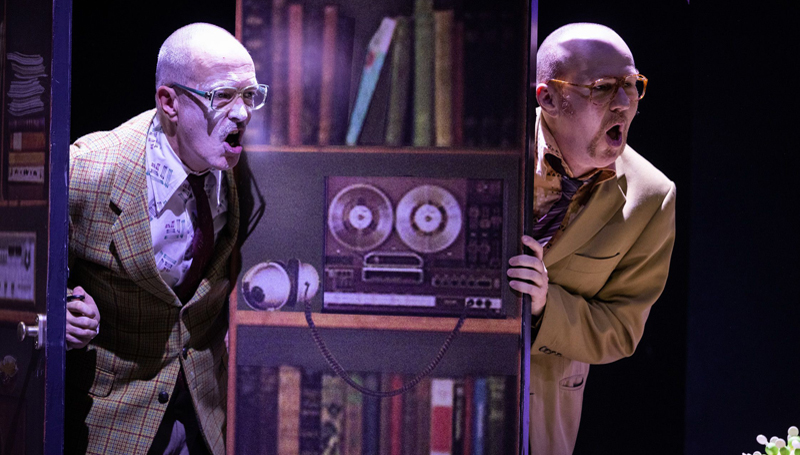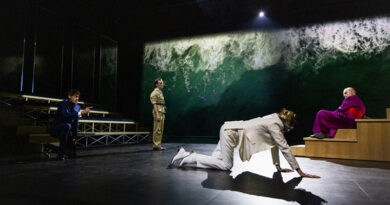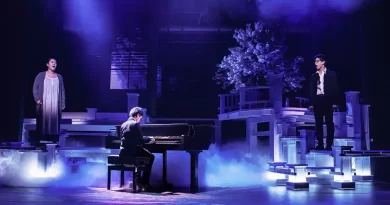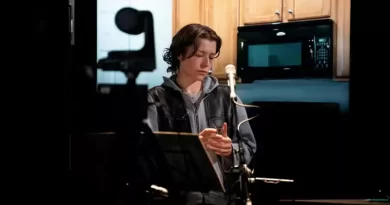“Oedipus – A Crime Comedy”, Dymnicki and Pschill
Ludovico Lucchesi Palli in Vienna
30 September 2021
Kaja Dymnicki and Alexander Pschill are founding members of Vienna’s Bronski & Grünberg Theater. They have joined forces with the ensemble of the TAG (Theater an der Gumpendorferstraße) in order to bring their newest production to the stage.
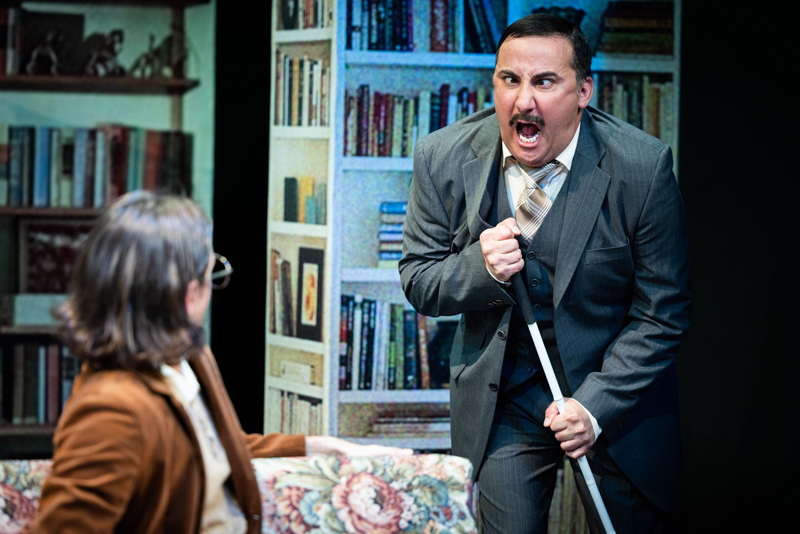
Stefan Lasko and Florian Carove.
Photo credit: Anna Stöcher.
Based on characters from Greek mythology, this adaptation of Oedipus is a humorous take on the myth of Oedipus but set in a modern-day dramedy. The play begins with Oedipus who briefly but in a very childish, nerdy tone, reveals that this is his story. Shortly after he exits, the rest of the cast gather around in the form of a chorus to tell the story, how Oedipus was the son of Merope and Laios but as the mythology said that he would kill his father Laios and sleep with his mother Iokaste, they decide to give him away as a child. This is told with much humour, slapstick, and astute comic observation all of which works well and serves to set the tone for the remainder of the play.
We then fast forward 18 years to see Iokaste and Laios throw a party and by accident invite Oedipus with his foster parents Merope and Polibos. The first few minutes of the party scene don’t really seem to progress the story other than to present Polybus and Merope as overprotective adoptive parents. Both are flamboyant, particularly Merope, while Iokaste and her husband Laios are childless and have other marital issues on their minds. Laios is manly, almost macho, while Iokaste is somewhat over the top, feminine, but clearly lonely, as she often reveals how Laios goes off “to buy cigarettes” and returns months later. We also meet Kreon, who is Iokaste’s brother. His function is mostly unclear. Lastly, the only two non-family members at the party are Janus and Isabella Sphinkt who challenge Oedipus with riddles.
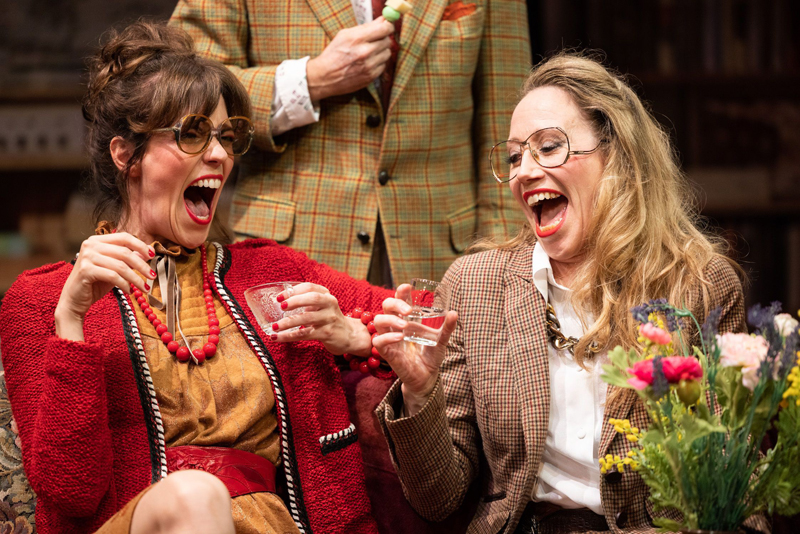
Lisa Schrammel and Michaela Kaspar.
Photo credit: Anna Stöcher.
Oedipus is put to sleep as he feels unwell, but when he wakes up, he decides to call the oracle, which is yet another humorous reference to Greek mythology. Here he picks up the phone and calls the oracle for advice. Once the oracle has told him that he will kill his own father and sleep with his mother he is understandably confused and decides to leave the party and to start his own life. Soon after, he gets into a fight with Laios who he almost by accident kills (he does not know that Laios is his biological father, but of course the Greek mythology around Oedipus is parodied here), hides himself behind a door and then, as he is about to leave, meets Iokaste. Oedipus asks the audience whether or not he should ask her to follow him into the bedroom which is an interesting way to focus the story on the title role and to get audience members (who later get a chance to show their opinions with a vote) involved in the story. The chorus then jumps back in and narrates the next part of the story in which we fast-forward another unit of 18 years.
Again there is a party, at the same house, even with the same food. But this time, Laios has disappeared and up until now, nobody has ever inquired about him which really surprized me. However, as the evening unfolds, everything is revealed. In any case, Laios is gone, Oedipus is now married to Iokaste, and they have adopted Antigone, Polyneikes and Eteokles, even though we only meet Antigone, who is personified by a grumpy teenage daughter which is very effective. Oedipus once again calls the oracles who claim that unless the truth behind Laios’ sudden disappearance is revealed, a curse will take over proceedings.
This is where prosecutor Theiresias is invited over. He eventually reveals the truth but not only regarding Laios suddenly disappearing. He also uncovers the fact that Iokaste and Laios are Oedipus’ biological parents. All of this comes to light at the dinner table when Merope and Polibos come for a surprise visit and Laios suddenly returns and declares that this is a patchwork family. This is all very humorous and works well in terms of dramatic technique even though it is strange that nobody notices that Laios is gone.
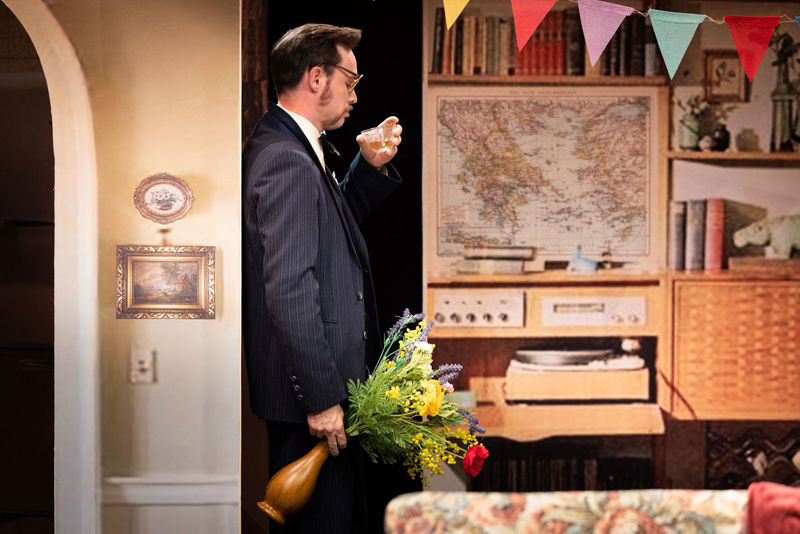
Raphael Nicholas.
Photo credit: Anna Stöcher.
The cast features two actors from Bronski & Grünberg Theater. Julia Edtmeier can be seen as the nerdy Isabella Sphinkt. She is a guest at the first party, the daughter Antigone, and also the voice of the oracle. Edtmeier does all this with an intelligent awareness of every conceivable gag in the script. Florian Carove is her childish, nerdy and extremely humorous husband Janus Sphinkt as well the crazy prosecutor Theiresias. Carove is a comedian of abundant gifts and has magnetic qualities. The title role is portrayed by Stefan Lasko who is credible as a pairing with Michaela Kaspar in the role of Iokaste. Lisa Schrammel as Merope overplays her hand a little but draws plenty of laughs and she harmonizes well with Jens Claßen as Polybos who excels with physical humour. Lastly, Raphael Nicholas impresses as Kreon and is at his best when in conflict with Antigone.
The sets mainly consist of a bright living room with flower-decorated sofas. A library and kitchen are photographed in the background, a ruse that is impressively real and reminiscent of a 1990s sit-com. It is all of a piece with the kind of humour being delivered. Despite a few difficulties at the beginning in their handling of the core material, the duo Dymnicki-Pschill have written, directed and designed a humorous adaptation of a central piece of Greek mythology with a lot of slapstick and a few hilarious references to the original. They demonstrate their understanding of the source text and their ability to turn it into something completely different. Comedy is a prime concern of the company even if some of the characters are as a result portrayed in too broad a manner but that’s a hallmark of the Dymnicki/Pschill style.

